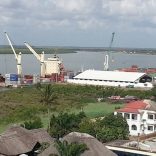Mozambique: International reserves increase again in April
Mozambique to meet wary creditors to discuss debt restructuring

Mozambique will meet its commercial creditors on Tuesday in London to present proposals on how to restructure its huge debts, but Eurobond holders and analysts expressed little confidence on how much progress can be made.
Shortly after restructuring a Eurobond in 2016, Mozambique’s government admitted to $1.4 billion of previously undisclosed loans, much of which was spent on building a state tuna-fishing company and enhancing maritime security.
But in the 17 months since Maputo said its debt was unsustainable and needed restructuring, little progress seems to have been made and there has been little contact between the government and its creditors.
“Put simply, it is not clear what the government is going to say to creditors,” Stuart Culverhouse at Exotix Capital wrote in a note to clients. “Without any discussions, it is not clear what Mozambique wants to present and how it will be received.”
The IMF said in a report last month that Mozambique’s debt situation had seen a “stark deterioration” due to a delayed fiscal response to a fall in commodity prices, hidden loans and its currency nearly halving in value since the end of 2014.
The country’s external public debt is seen rising to $13.3 billion this year from $10 billion in 2016, according to the IMF. Its external public and publicly guaranteed debt is expected to peak in 2023 at more than 370 percent of gross domestic product, while economic growth in the near-term looks anaemic, the fund said.
Meanwhile, its overall external arrears have been building up rapidly, hitting $709.7 million by the end of 2017, more than 80 percent of which is owed to commercial creditors. But Mozambique is also in arrears to the governments of Brazil, Libya, Iraq, Angola, Bulgaria and Poland.
While Maputo has made some inroads on reforms, such as abolishing fuel and wheat subsidies, the outlook remains challenging, it said.
Eurobond holders reading the latest IMF reports, which include government responses, were concerned about the differences between the two sides’ outlooks. In particular, Maputo said it envisages a slower path to fiscal consolidation than suggested by the fund.
“It is rare for any country to hit all the targets that the IMF sets out anyway, but they need to be seen to be trying,” said one bondholder who declined to be named. “The response isn’t exactly encouraging.”
However, the discovery nearly a decade ago of substantial offshore gas reserves has spurred hopes that one of the world’s poorest nations could become a major exporter of liquefied natural gas (LNG)- so far the only likely long-term solution to its deep financial problems.
“The big bet with Mozambique is do you believe the LNG plants will start on time?,” said Greg Smith, fixed income strategist at Renaissance Capital. He said delays to the projects, which are expected to become operational around 2023, could make investors think very differently.
Mozambique is not the only country in trouble in Africa. In 2017, both Congo Republic and Chad defaulted or tried to renegotiate their debt, while Angola announced it wanted to extend maturities in 2018.
Tuesday’s meeting at law firm White & Case LLP will see finance minister Adriano Maleiane and restructuring adviser Michele Lamarche from Lazard present key elements of the restructuring proposals and update commercial creditors on fiscal and macroeconomic developments.
Among Mozambique’s commercial creditors are those holding a 2023 Eurobond that has $727 million outstanding, but also those holding hidden loans: A $535 million facility arranged by Russian lender VTB to state-firm Mozambique Asset Management (MAM) and a $622 million loan arranged by VTB and Credit Suisse for maritime security projects run by security firm Proindicus, owned by the defence and interior ministries and the state security service.
The bondholders have so far dug in their heels. The Global Group of Mozambique Bondholders (GGBM) has said that it already accepted a debt swap in 2016 and that other lenders should be first in line to take any more hits.
“The GGMB and bondholders who are supporting it continue to hold over 80 percent of the bonds and accordingly any resolution of the Eurobonds will need to reflect our position,” said the group’s legal adviser, Thomas Laryea at Cooke Robotham LLC.













Leave a Reply
Be the First to Comment!
You must be logged in to post a comment.
You must be logged in to post a comment.